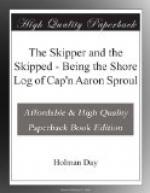“I tell you I don’t!” bawled the skipper.
“Why, yas you do.”
“Say, look a-here, What’s-your-name, I’m goin’ to give ye ten seconds to tell me the name of that critter.”
He made a clutch to one side, and then remembered with a flush that he was no longer in reach of a spike-rack.
“Why, that was Kun’l Gideon Ward,” faltered Uncle Jordan, impressed at last by the Cap’n’s fury. “I thought ye knew.”
“Thought! Thought! Why, ye never thought in your life. You only thought you thought. I dunno no more who you mean by ’Kun’l Gideon Ward’ than as though you said General Bill Beelzebub.”
“Why, yas you do—”
“There you go again! Do you mean to stand here and tell me I’m a liar?”
The glare in the seaman’s eyes was too fierce to be fronted.
“Kun’l Gideon Ward is—is—wall, he’s Kun’l Gideon Ward.”
Jordan backed away suddenly at the oath the Cap’n ripped out.
“He owns more timber land than any other man in the county. He hires more men than any one else. He ain’t never been downed in a trade or a fight yet. He’s got double teeth, upper and lower, all the way round, drinks kairosene in the winter ‘cause it’s more warmin’ than rum, and—and—”
“Well, what’s that got to do with his runnin’ toll on this bridge?” demanded the Cap’n.
“Bridge piers hold up his logs, he says, and he ain’t never goin’ to pay toll till the bridgemen pay him for loss of time on logs. It’s been what you might call a stand-off for a good many years. Best thing is to let him run toll. That’s what your uncle thought. I reckoned you knew all about Kun’l Gid Ward. Why, everybody knows—”
“Say, you let up on that string right now and here,” snorted the Cap’n.
Old Man Jordan trotted away.
While the skipper was still pondering on the matter of Colonel Ward—the meditation had lasted over into the next day—there was a roar on the bridge, and the subject of his reflections passed in a swirl of dust on his return trip. He was standing up in his wagon as before, and he saluted the indignant toll-man with a flick of his whip that started the dust from the latter’s pea-jacket.
“He’s been over to the home place to see his sister Jane,” volunteered Uncle Jordan, again on his way to the village with eggs. “She ain’t never got married, and he ain’t never got married. Old Squire Ward left his whole property to the two of ’em, and the Kun’l ain’t ever let it be divided. He runs the whole estate and domineers over her, and she don’t dast to say her soul’s her own. If I was Jane I’d have my half out and git married to some nice man, and git a little comfort out’n life. He don’t give her none—don’t let her have the handlin’ of a cent of money. She’s a turrible nice sort of woman. There’s risin’ a hundred thousand dollars in her share, if the truth was known, and there’s been some pretty good men shine up around her a little, but the Kun’l has run ’em away with a picked stick.”




